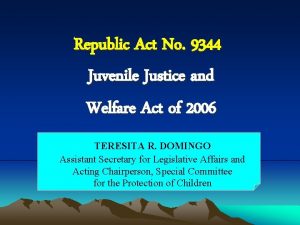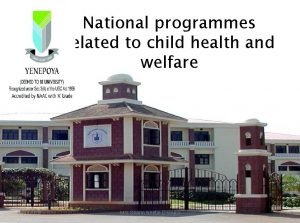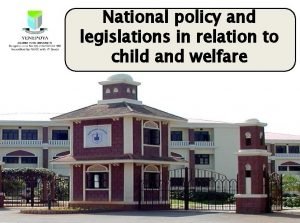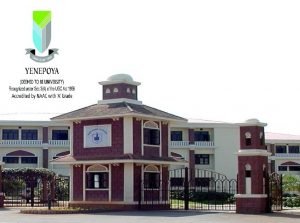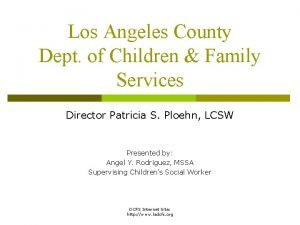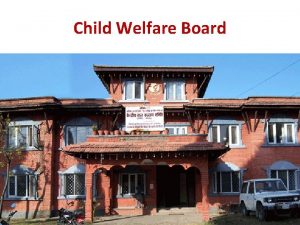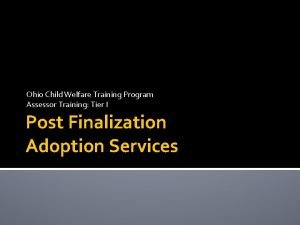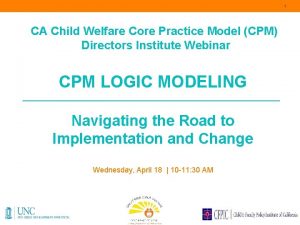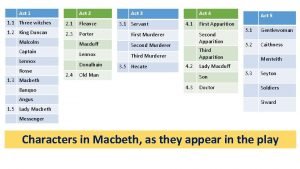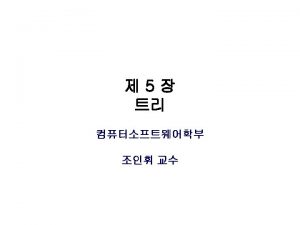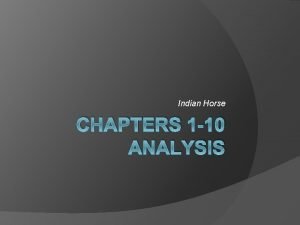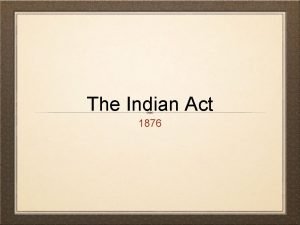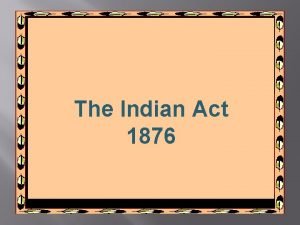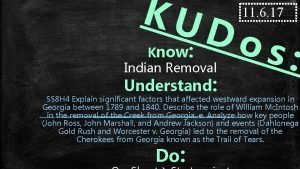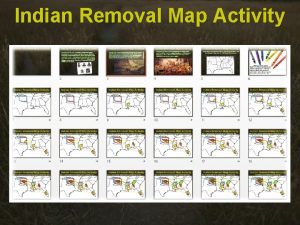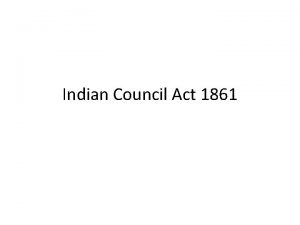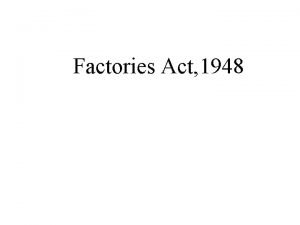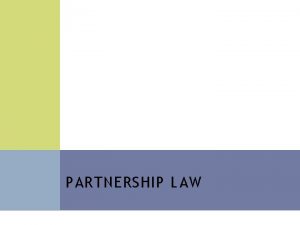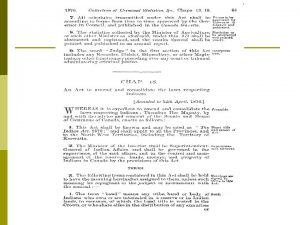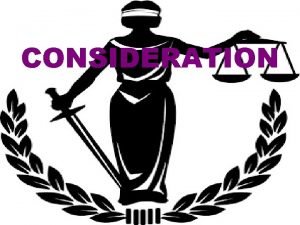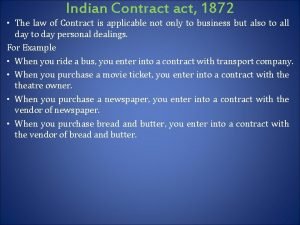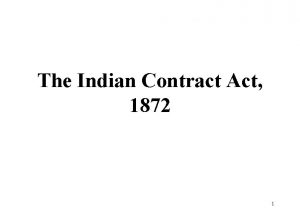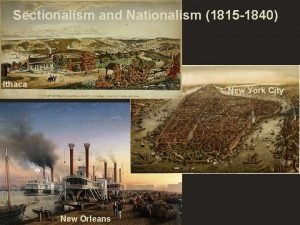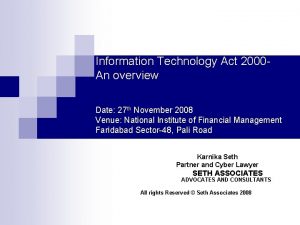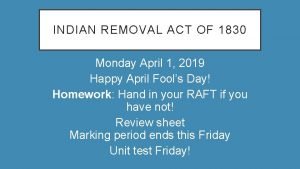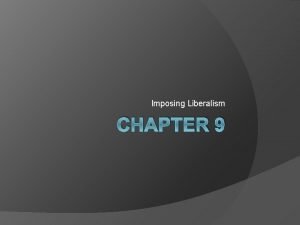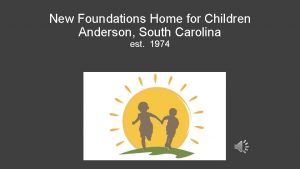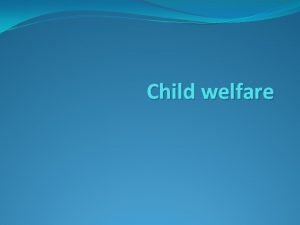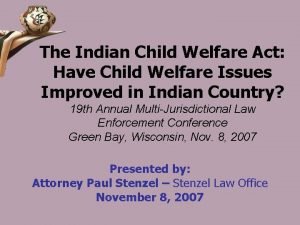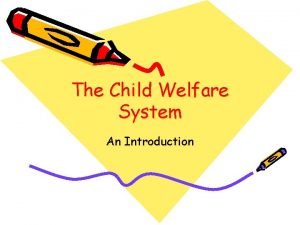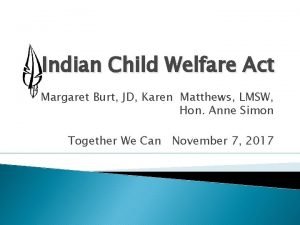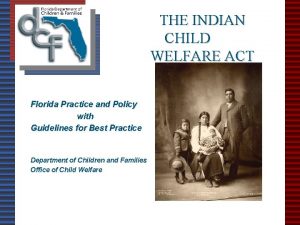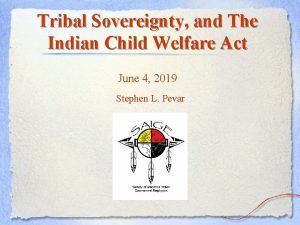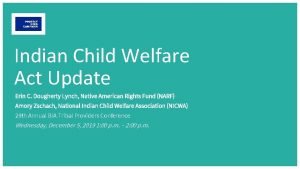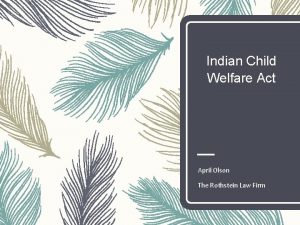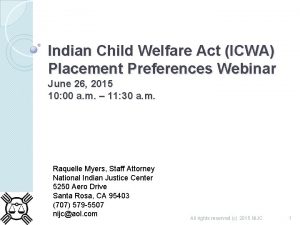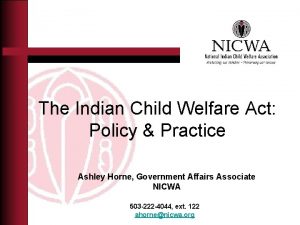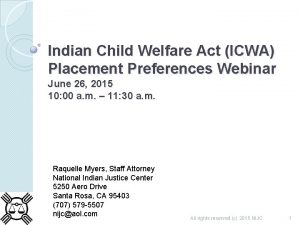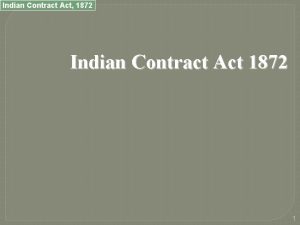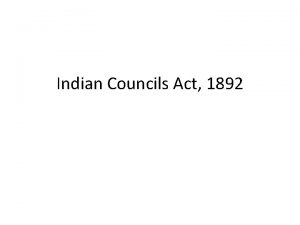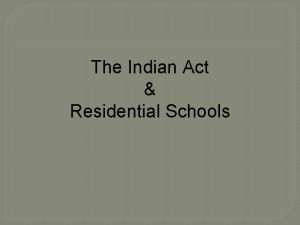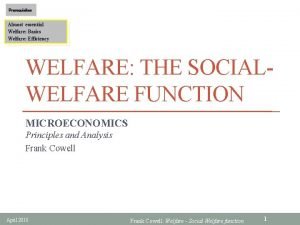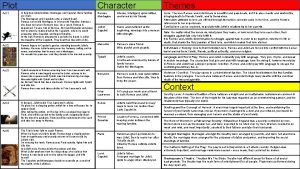The Indian Child Welfare Act New Issues Whats












































































- Slides: 76

The Indian Child Welfare Act New Issues - What’s Different? Presented by Margaret A. Burt, Esq. Copyright 2016

ICWA IS ABOUT… • The rights of the tribe* – a separate government • The preservation of tribes and native culture • The child’s right to to political identity • “Tribe” can also be “band” “nation” “community” • § 1903(8)

FEDERAL LAW ICWA 25 U. S. C. A. § 1901 -1963 1978 Predates the federal child welfare laws we all work with everyday!

STATE LAW • State can incorporate ICWA into state law • State can add to fed ICWA law – 25 USC § 1921 • State cannot subtract from fed ICWA law • Fed law applies to states even if there is no reference in state law

WHY? • Stop unnecessary removal of Indian children • Don’t disconnect child from culture and tribe • Promote tribal involvement in Indian children’s lives

PRIOR TO ICWA • Cultural bias in removals • “Save” child by removing from tribal culture • Policy of assimilation • Boarding schools • Infant Adoption programs

What is “purpose”? • Feds determined that stats clearly showed : “an alarmingly high percentage of Indian families are broken up by the removal, often unwarranted, of their children…by nontribal public and private agencies…”

FEDERAL POLICY • Protect Indian children • Preserve Indian families • Place Indian children where culture is valued

WHAT? Special requirements on state courts when Indian children are to be placed outside the home or freed for adoption.

An ICWA child welfare case that remains in state court requires following state law and federal ICWA

Requires • Courts to make decisions that reflect value of tribe and Indian family connections – requires expert testimony to be heard and considered • Agency to provide more than diligent efforts “active efforts” to compensate for children having been more likely to be placed outside of the home • Higher burdens of proof to remove children and free them for adoption

Adoptive Couple v Baby Girl “Baby Veronica” SCOTUS 6/25/13 US Supreme Court recently interpreted ICWA in a private adoption case. Does this change how we handle ICWA cases, particularly in child welfare?

More Questions to Resolve! • What actually happened in Baby Veronica? • The SCOTUS decision – The Majority opinion –Alito, Roberts, Kennedy, Thomas and Breyer The Concurring opinions – Thomas, Breyer The Dissenting opinions – Sotomayor, Ginsberg, Kagan and Scalia (in part)

AND NOW-- • New Guidelines as of 2/25/15 that change a lot • Possibly regulations are coming

The Key Questions • • • 1. Is this an ICWA child? 2. Is this an ICWA action? 3. What is the proper jurisdiction? 4. Who needs to be noticed? 5. What are the special evidentiary rules if the matter stays in state court? • 6. What are the placement preferences? Is anything impacted by Baby Veronica case or the new guidelines?

Question 1 • Is this an Indian child under the Indian Child Welfare Act? • § 1903 (4)

WHO IS AN INDIAN CHILD? A POLITICAL QUESTION • • Unmarried and Under 18 years old and Member in a federally recognized tribe or Eligible to be a member and the biological child of a member • NOTE: Statute uses term “member” some tribes use other terms like enrolled

What makes a child a “member” or eligible to be a member? What are the tribes membership? Again – may use different terms , such as enrollment

ISSUES • Is membership about blood quantum? • How will agency, court learn membership rules? • What do federal guidelines say? • What about MEPA?

MORE ISSUES • What about Canadian tribes? • What if one sibling is an Indian child but the other is not? • What if the child is raised in tribal culture but is not enrollable? • Do tribes have to follow ICWA?

REMEMBER… There are over 500 other federally recognized tribes in the US, and any child in your state could be a member or eligible to be a member of those

Bottom Line: • Only the sovereign entity of the tribe can determine if the child is an ICWA child as only they can determine if child is a member or enrollable as a member and a child of a member • NEW – Guidelines say a court should follow ICWA procedures if they have a reason to think child is Indian until they know for sure from the tribe

Does Baby Veronica change this? • Does not seem like the case changes the determination if a child is in fact an “ICWA child” as case focuses on if ICWA should be applied to the case • Court would still need to know if child is enrolled or enrollable

Question 2 • Is this an action or proceedings that requires the application of the Indian Child Welfare Act? • § 1903(1)

TO WHAT LEGAL PROCEEDINGS DOES IT APPLY? • Child being placed in foster care due to abuse/neglect (or transferred) • Child being placed on status offenses or voluntary where child cannot be returned upon demand

MORE APPLICATIONS • • Child custody with non-parent Termination proceedings Pre-adoptive placements Adoptions—including stepparent, public and private

• • • Does NOT apply to: Divorce or Custody Between Two Parents Juvenile Delinquency Paternity /Support Domestic Violence Totally Voluntary/At Will Placements NOW - Private Adoptions where only objecting parent never had physical or legal custody and abandoned before birth?

PROTECTS: • Indian children • Bio parents of Indian children (even if they are non-Indian) • Indian custodians

NOT PROTECTED BY ICWA: • Unwed fathers who have not acknowledged paternity. • Non-Indian parents who adopted an Indian child. • NOW – parents who have never had legal or physical custody? ? Only in adoptions?

Does Baby Veronica apply? • The decision indicates that ICWA does not apply where the parent raising the ICWA application question has not ever had legal or physical custody of the child • Caution – Does this really apply in most child welfare cases? Most times it is both parents who oppose governmental action

• ICWA issues may well be relevant in matters even though statute need not be applied. • Applies to terminations and adoptions even if did not apply to original placement.

Question 3 • Where is the case heard? Who has jurisdiction? State court? Tribal court? Both? • § 1911

Concepts • Exclusive jurisdiction – only can be handled by a tribal court • Transfer – can be moved from state court to tribal court • Right to Intervene – tribe can be involved in the state court action § 1911

INDIAN TRIBE EXCLUSIVE JURISDICTION • § 1911(a) • Indian child who is a ward of a tribal court • Indian child who resides or domiciled on a tribal reservation – state court can determine residence or domicile Mississippi Band of Choctaw v Holyfield 490 US 30 (1989)

EXCEPTIONS TO EXCLUSIVE JURISDICTION RULE • Older federal law allowed for concurrent jurisdiction but now some have retroceded

STATE COURT JURISDICTION Indian child who does not live on the reservation BUT subject to transfer to a tribal court or to intervention by tribe in state court proceeding So if it is not exclusive jurisdiction to tribal court the two options are: Transfer or Intervention § 1911 (b) and (c)

Transfers to Tribal Court • Tribe or parent can ask for the transfer at any time • Either parent (tribal or not) can oppose and stop the transfer • State court must transfer if both tribe and parents want it and can only retain jurisdiction if there is “good cause” • Court can transfer case but child can stay in state care • Adoptive placement transfers? —courts have split

Good Cause to Refuse Transfer? • • • Either parent or tribe says no New Guidelines: “Existing Indian Family” -NO Bonding – NO; “Advanced Stage” – NO Not sufficient contact with tribe – NO NO to a best interest analysis – ICWA says what is in child’s best interests • NO review of what tribal court might do

TRIBAL INTERVENTION IN STATE COURT • • • Tribe’s right At any time – including appeals! Parent, agency, child, court cannot prevent Even where not going to appear in person Not specifically listed for adoption proceedings

REMEMBER ICWA APPLIES EVEN IF TRIBE DOES NOT APPEAR OR IS UNABLE TO BE INVOLVED

Has this been affected by Baby Veronica? • Seems not as there was no argument about jurisdiction between the courts • BUT – IF SCOTUS is saying that ICWA does not apply to some types of cases that we thought it did apply to in the past, then it would impact if there is a jurisdiction question to argue – are they saying that or are they saying only certain provisions are not applicable?

Question 4 • Who gets noticed? • § 1912 • The parent or custodian • The child’s tribe • By registered mail with return receipt requested

Notice • Formal notice must be done exactly as law describes – by registered mail with return receipt requested • Each “new” proceeding requires notice • Notice goes to all parents and custodians – even if not tribal • Notice goes to any tribe that might be child’s tribe or BIA

NOTICE QUESTIONS • Member of more than one tribe? • Not sure if child is a member or eligible for membership? • Child’s parents? • Unwed fathers? • Timing? • Who actually sends the notice out?

Baby Veronica Applied? • Seems like this process would still be needed. Seems that court would still need to know if tribe was claiming child to be ICWA before deciding if ICWA did in fact apply or if Baby Veronica exception applied

Question 5 • What are the special evidentiary rules that have to be applied if the matter stays in state court?

REMOVAL ISSUES • § 1912 (d) and (e) • Qualified expert witness • Likely to result in serious emotional or physical damage if child remains • Clear and convincing burden of proof • “Active efforts” – New Guidelines say must start as soon as removal may be possible, rules apply regardless of where child lives – emergency? Only 30 days

What are “active efforts”? • Efforts by the state to provide remedial services and rehabilitative programs that have not been successful • MORE than “reasonable efforts” • CLEARLY meant to include working with tribe and seeking tribal resources • New Guidelines say must be done up to start of proceedings – gives examples • New Guidelines say ASFA exceptions to reasonable efforts DO NOT APPLY!

When are ICWA experts (QEWs) used? Required to testify in court where ICWA child and requested Removal from Home or Termination of Parental Rights Possibly advise agency, tribe and court where ICWA child on placement decisions

Who is this QEW and what are they supposed to do? • Member of Indian child’s tribe who is recognized by tribal community as knowledgeable in tribal customs as they pertain to family organizations and childrearing practices OR

• The new guidelines say that next best would be: • Member of another tribe who is recognized to be a QEW by the child’s tribe based on their knowledge of the delivery of child and family services to Indians and the child’s tribe And the new guidelines say that 3 rd best is:

A layperson who is recognized by the child’s tribe as having substantial experience in the delivery of child and family services to Indians, AND knowledge of prevailing social and cultural standards and child rearing practices within the Indian child’s tribe

The new fed guidelines describe the last option as -A professional person having substantial education and experience in the area of his or her specialty who can demonstrate knowledge of prevailing social and cultural standards and child rearing practices of child’s tribe

Who has to offer the expert’s testimony? Is it paid for? Can there be more than one witness? If there is no objection to what is occurring, will there still have to be a QEW testifying? Court should determine if offered person is proper QEW and make that ruling

What is the expert supposed to testify about? • Removal of an Indian child from his or her family must be based on competent testimony from one or more experts qualified to speak specifically to the issue of whether continued custody or return to custody of parent or Indian custodian is likely to result in serious physical or emotional damage to the child

Why do you need an “expert” on Indian issues to prove likely damage to a child? The party who is seeking to have the child removed or parental rights terminated must prove to the court that active efforts, in the context of the prevailing social and cultural conditions and way of life of the Indian tribe, have been made and that available family and tribal services and been used and that the risk is still present

So what kind of things would an expert need to know about? the tribe’s history how children are viewed by the tribe child rearing in the tribe use of discipline cultural expectations tribe’s services family’s history protective issues in family particular incidents this child’s needs agency responses tribe and family view of situation

QEW will be asked THE opinion question Do you have an opinion within a reasonable degree of certainty as to whether continued custody/return to custody by the child’s parents would likely result in serious physical or emotional damage? What is that opinion?

Absent extraordinary circumstances, no emergency or temporary removal of an ICWA child should occur for more than 30 days without the proper ICWA removal procedures What happens if you do not know the child is ICWA for longer than 30 days?

VOLUNTARY PLACEMENT OR SURRENDER ISSUES • Consent must be in writing and before a family court type judge for voluntary placements or surrenders • Judge’s certificate, language • More than ten days after the birth for a surrender • Can withdraw consent to a voluntary--child is returned • Can revoke surrender before an adoption--child is returned

TPR ISSUES • ASFA applies – including the exceptions! • § 1912 (f) • Qualified expert • Return home would likely result in serious emotional or physical damage • Beyond a reasonable doubt burden of proof

ADOPTION ISSUES • Revocable before final decree--return to parent • Adoption can be vacated on fraud/duress grounds--return to parent • No adoption can be vacated after two years

• What if an adoptive parent later surrenders an ICWA child? There can be a petition to return the child to the birth parents 25 USC § 1916

Baby Veronica apply to this question? • YES, this seems the most affected. SCOTUS said that the heighted standard of proof did not apply to a parent who had never had prior legal or physical custody and that “active efforts” did not apply where parent had abandoned child before birth and never had physical or legal custody • BUT – what does this mean in our typical child welfare matter?

Question 6 • What are the placement preferences?

Concepts • Placements in descending order • Don’t move to the next one without documenting reason • Specify why moving to next level in court order • There are good cause arguments but be careful • Tribe can change preferences and child and parent’s positions can be considered

FOSTER CARE PLACEMENTS • • Least restrictive setting Reasonable proximity to their home Special needs Preferences -25 USC § 1925 (b) – 1. extended family – Indian and non Indian family – 2. foster home licensed, approved, or specified by tribe – 3. Indian foster parents licensed or certified by state/county/ authorized agency – 4. institution approved by a tribe or operated by a tribe – LAST – state/county licensed non Indian foster home

ADOPTIVE PLACEMENTS Preferences – 25 USC§ 1915 (a) • 1. Extended family members – Indian and non Indian family • 2. Members of child’s tribe • 3. Other Indian families • 4. Other non-Indian families

Guidelines – Can you deviate? • Tribe has described different preferences by tribal resolution • Request of parents (if they have reviewed options) • Request of child if mature • Extraordinary needs of the child (QEW) • Nothing available at each level after active efforts to locate • NEW- AGENCY must prove why and diligent efforts to comply by clear and convincing evidence and provide notice to everyone -

No Good Cause to Deviate From Preferences? • Bonding with placement family that did not comply with ICWA is not good cause • “Best interests” of child may not be considered as ICWA encompasses child’s best interests • Anonymity is not good cause • Court may not deviate due to socioeconomic differences in placement alternatives

Baby Veronica apply here? • YES, SCOTUS said that the adoption preferences are not triggered until some party in that particular case within the preferences also seeks to adopt. • SO – does this part of the decision only apply to adoptions? • What does it mean to placements in foster care – must there be an alternative placement being offered? When?

25 USC § 1912 (b) Right to counsel for parents and custodians

RIGHTS OF ADULT ADOPTEES TO RECORDS 25 USC § 1917

FAILURE TO FOLLOW ICWA? Parent, Indian custodian or tribe may petition to invalidate the order under 25 USC § 1914

ASK, ASK • Caseworkers, court and attorneys should make it routine to ask • ICWA findings at every stage clearly documented in court order

STEPS • Training • Agency forms and procedures • Court procedures
 Republic act number 9344
Republic act number 9344 National health intervention programme for mother and child
National health intervention programme for mother and child National policies related to child health and welfare
National policies related to child health and welfare International child welfare organizations
International child welfare organizations All india women's conference was founded by
All india women's conference was founded by Children and family services los angeles
Children and family services los angeles Central child welfare board
Central child welfare board Ohio child welfare training program
Ohio child welfare training program Child welfare
Child welfare Vr3 child welfare foundation
Vr3 child welfare foundation California child welfare core practice model
California child welfare core practice model Issues in indian commerce
Issues in indian commerce Macbeth act 3-5 summary
Macbeth act 3-5 summary 패자트리
패자트리 New mill indian f07
New mill indian f07 Indian horse chapter 1-10 summary
Indian horse chapter 1-10 summary Slidetodoc
Slidetodoc Indian act 1876
Indian act 1876 Who signed the indian removal act of 1830
Who signed the indian removal act of 1830 Indian factory act
Indian factory act Trail of tears map activity
Trail of tears map activity India council act 1861
India council act 1861 Objectives of factories act 1948
Objectives of factories act 1948 Types of partners in partnership act 1961
Types of partners in partnership act 1961 Indian act definition
Indian act definition Consideration section 2(d)
Consideration section 2(d) Indian contract act 1872
Indian contract act 1872 Nature of indian contract act 1872
Nature of indian contract act 1872 Indian removal act of 1830
Indian removal act of 1830 It act 2000
It act 2000 Indian removal act of 1830
Indian removal act of 1830 Indian it act
Indian it act Hát kết hợp bộ gõ cơ thể
Hát kết hợp bộ gõ cơ thể Lp html
Lp html Bổ thể
Bổ thể Tỉ lệ cơ thể trẻ em
Tỉ lệ cơ thể trẻ em Voi kéo gỗ như thế nào
Voi kéo gỗ như thế nào Tư thế worms-breton
Tư thế worms-breton Chúa sống lại
Chúa sống lại Môn thể thao bắt đầu bằng chữ đua
Môn thể thao bắt đầu bằng chữ đua Thế nào là hệ số cao nhất
Thế nào là hệ số cao nhất Các châu lục và đại dương trên thế giới
Các châu lục và đại dương trên thế giới Công thức tính thế năng
Công thức tính thế năng Trời xanh đây là của chúng ta thể thơ
Trời xanh đây là của chúng ta thể thơ Cách giải mật thư tọa độ
Cách giải mật thư tọa độ Làm thế nào để 102-1=99
Làm thế nào để 102-1=99 Phản ứng thế ankan
Phản ứng thế ankan Các châu lục và đại dương trên thế giới
Các châu lục và đại dương trên thế giới Thể thơ truyền thống
Thể thơ truyền thống Quá trình desamine hóa có thể tạo ra
Quá trình desamine hóa có thể tạo ra Một số thể thơ truyền thống
Một số thể thơ truyền thống Cái miệng nó xinh thế chỉ nói điều hay thôi
Cái miệng nó xinh thế chỉ nói điều hay thôi Vẽ hình chiếu vuông góc của vật thể sau
Vẽ hình chiếu vuông góc của vật thể sau Thế nào là sự mỏi cơ
Thế nào là sự mỏi cơ đặc điểm cơ thể của người tối cổ
đặc điểm cơ thể của người tối cổ Thứ tự các dấu thăng giáng ở hóa biểu
Thứ tự các dấu thăng giáng ở hóa biểu Vẽ hình chiếu đứng bằng cạnh của vật thể
Vẽ hình chiếu đứng bằng cạnh của vật thể Vẽ hình chiếu vuông góc của vật thể sau
Vẽ hình chiếu vuông góc của vật thể sau Thẻ vin
Thẻ vin đại từ thay thế
đại từ thay thế điện thế nghỉ
điện thế nghỉ Tư thế ngồi viết
Tư thế ngồi viết Diễn thế sinh thái là
Diễn thế sinh thái là Dot
Dot Bảng số nguyên tố
Bảng số nguyên tố Tư thế ngồi viết
Tư thế ngồi viết Lời thề hippocrates
Lời thề hippocrates Thiếu nhi thế giới liên hoan
Thiếu nhi thế giới liên hoan ưu thế lai là gì
ưu thế lai là gì Hổ sinh sản vào mùa nào
Hổ sinh sản vào mùa nào Khi nào hổ con có thể sống độc lập
Khi nào hổ con có thể sống độc lập Sơ đồ cơ thể người
Sơ đồ cơ thể người Từ ngữ thể hiện lòng nhân hậu
Từ ngữ thể hiện lòng nhân hậu Thế nào là mạng điện lắp đặt kiểu nổi
Thế nào là mạng điện lắp đặt kiểu nổi New foundations anderson sc
New foundations anderson sc Child rights act 2005 images
Child rights act 2005 images Child, youth and family services act, 2017
Child, youth and family services act, 2017
